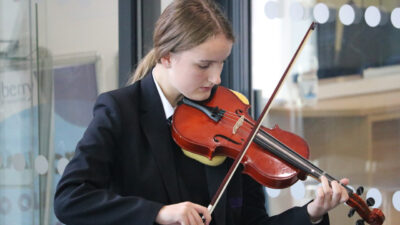Who is IQM?
IQM is the only national inclusion award in the UK. For over 20 years and in over 20 countries, schools, MATs and Local Authorities use the Inclusion Quality Mark to recognise exemplary inclusive practice.
Get in touch for your FREE school information pack today.
Mulberry Academy Shoreditch Achieves Flagship Status
October 9, 2023
Mulberry Academy Shoreditch has achieved the Inclusive School Award with Flagship status.

Students Fully Engaged
Our Assessor’s tour of the school was led by the energetic Executive Principal who guided through every part of the building dropping in on classrooms and talking to students and staff along the way. It was obvious that this is not out of the ordinary and she is often out and about and visiting classrooms even when she does not have visitors in tow!

The school was found to be calm and well ordered and students were fully engaged in their lessons. The building is well maintained and despite the increased number of students it did not feel overcrowded although space is at a premium. The 100 minute lessons mean that movement around the building is vastly reduced and the staggered lunchtime arrangements allow students to get their food easily and have time for some outdoor activity. The playground space is small but is organised and used well.
The Executive Principal explained the school was vastly oversubscribed and the Sixth Form had expanded to more than 600 students. Whilst this is an amazing achievement and allows the academy to offer a very broad curriculum and qualifications – basically something for everyone – it also presents problems of dedicated post 16 space. The academy is still growing which means that the budget is not as stretched as it might be under different conditions. The leadership is very aware of this and the Headteacher is determined to make sure the building is invested in and developed to meet the needs of the students. Furthermore, staff are invested in and are given many opportunities to develop their careers and experience. This means the academy is able to retain teachers for longer which is important for the stability of the school.
Innovation is Integral to this Dynamic School
The academy is quick to look for development opportunities for the institution and is to become a Teaching School and is hoping to be funded to open an Alternative Provision in partnership with the Local Authority (LA). Discussions and planning are underway. The Executive Principal and her team are prepared to take risks, try something new and to volunteer for various pilot projects because they understand that standing still is not an option. Innovation is integral to this dynamic school.

The first meeting of the day was with the Assistant Headteacher (Safeguarding and Pastoral) and one of the safeguarding team support staff. The Assistant Headteacher is the lead Designated Safeguarding Lead (DSL) but there is a team who meet together frequently to ensure that nothing goes unnoticed and children do not fall through the net! The safety net is strong and is constantly reviewed and strengthened.
Attendance across the academy is currently at 95% which is very pleasing. It was 93% five years ago and is now almost at pre-Covid figures. This goes against the national figures and our Assessor was told it is due to the strong systems in place and a very proactive attendance team. The attendance policy and practice is very robust and is well known by students and parents/carers. Some try to get round the system and students taken out of school for holidays and extended leave remains an issue.
Mental Health continues to be a big issue and is a safeguarding concern and is recorded as such. Joined up working with the pastoral team is key to tackling this and to providing support for students who are suffering from anxiety. Self-harm is increasingly an issue and some students talk about feeling suicidal. However, the numbers reporting these feelings are small but are taken very seriously. The staff know the children very well and are able to respond appropriately to concerns raised by students and parents as well as those raised by staff. A lot of the support happens in-house and there are two School Counsellors and a new Place2Be worker to provide additional support. The academy has also been allocated a social worker to the school for three days a week which is a very useful addition to the team. Wellbeing is high on the academy’s agenda and mindfulness is firmly on the curriculum.
Regular Updates for Staff
A Community Liaison Officer has been allocated to work with the school and a Police Liaison Officer keeps them updated about issues arising in the community, especially with reference to local gangs. It is acknowledged that the issue with gangs is different in Tower Hamlets than it is in neighbouring boroughs. The manifestation and makeup of gangs do not fit the national profile of a gang; however, there are still many problems that need to be addressed. The gang culture does not come into school but does go on in the community. More worrying is that so many students have seen and experienced serious youth violence and domestic violence and this can lead to trauma that has to be addressed by the school. Sadly, there is little or no Youth Service to keep youngsters occupied and supported during the evenings. The skilled youth workers that were once available to work with some of these children are no longer around.

The academy has a no exclusions policy but have had to do two fixed term suspensions last year, due to particular circumstances. However, this was very unusual and the Executive Principal explained how difficult it was to make that decision. There have been no permanent exclusions for over five years which is a big achievement.
The Assistant Headteacher explained that the academy audits itself constantly and has updated its policy according to the new Keeping Children Safe in Education (KCSE) document. Staff training is delivered at all levels and there are regular updates for staff and Governors.
The safeguarding team oversees the provision for children in care and keep records on the Child Protection Online Management System (CPOMS). There are 15 active files opened on CPOMS at the moment. The safeguarding team meets every two weeks and is joined by the Special Educational Needs Co-ordinator (SENCo) and other pastoral leads. This is where vulnerable students are discussed and provision is put in place or is reviewed to see what else is necessary to meet their needs. The relationship with the safeguarding team at the LA is generally good.
So Many Good Teachers
The next meeting was with three young men and one young woman who are currently in Year 13. Our Assessor had met them during a previous visit to the school for the original Inclusive Quality Mark assessment. At that time, they were unsure if they would stay at the academy for their post 16 education and had plans to go elsewhere. Subsequently, they decided to stay on and are very happy with the way they have been supported and educated and have been prepared for the next stage of their lives.
They said they decided to stay on because there are so many good teachers and lots of subjects to choose from at A level. They really value the enrichment activities on Wednesday afternoons and especially the partnership with Mercedes and the many Science, Technology, Engineering and Mathematics (STEM) activities available. They explained there are over 60 students in the STEM Academy and there are many opportunities to get involved in a range of different events and experiences including a computer programming course (Computer Science) with Fire Tech. They all take part in work experience with major companies and the academy sets the work experience up and support their travel costs and other expenses they may incur. They all spoke enthusiastically about their work experience and how this made them decide on where they were going next.
They were all heading off to Brackley for the annual competitions (headed up by Lewis Hamilton) where they have worked in teams to build a prototype racing car which they will race on the racetrack on the day. There is a male team, a female team and a Year 10 team participating next week. They have done very well in these competitions in previous years earning several second places. This year they are determined to get a first place!

Our Assessor asked the students what their plans were for the future. They were all applying for university and were considering different options about studying in London or moving further away. The cost of living and finance is a big issue for them to consider.
The academy had given them opportunities to visit different universities during their time at the school and now pay the cost of travel for them to visit universities that are in other parts of the country so they can make the right choice about where to apply. They spoke very positively about their Sixth Form tutors who are supporting them in writing their UCAS applications during form time. Furthermore, their form groups have been rearranged so that those who are applying to study similar subjects are now in the same tutor group so they can support each other.
The members of the STEM Academy spoken to wanted to study mechanical engineering and some wanted to go into motor sports. All had work experiences in major companies that specialise in these areas. Some had done summer schools in some of the universities to experience the subject in a university setting.
Students Were Very Happy
It was clear that the students were very happy with their experience in the academy thus far. They talked about the skilled and caring teachers who gave them confidence in their own ability and helped to raise their ambitions and the skills to reach their goals. They also explained that there is counselling available for any Sixth Form students who require it. The school has just put in a QR Code (around the Sixth Form area) to book an appointment in confidence.
The Sixth Form has become increasingly popular and there are now 600 students studying A Levels and BTECs and other relevant courses and our Assessor was also pleased to see the school has followed through with its promise to offer Foundation Courses so that students with Special Educational Needs (SEN) have the opportunity to participate.
When the IQM Assessor asked the students what would be ‘even better if” they pointed to the fact that there are so many students in the Sixth Form that they have to share space with the rest of the school. There is currently no common room or dedicated study space because the areas have had to be used for classrooms. Also, the fact that they have to move classrooms for different subjects since there are no dedicated Sixth Form rooms. They find this irritating. They have little or no place to go to at lunch time or break time although food is served in the Sixth Form area. They understand the pressures on space, as indeed does the Executive Principal. She would love to have a new Sixth Form building and area and is doing her very best to achieve it!
The students said they would also be happier if there were not quite so many tests/assessments (every half term) although one or two said these were helpful.
Support Students with SEN
Next, our Assessor met with the SENCo and the Learning Support Centre (LSC) Manager to review Target One which was to expand Autism Spectrum Disorder (ASD) provision to support students with ASD. The LSC Manager has been part of the school for six years and is now training to be a teacher. However, she is adamant that she wants to continue to support students with SEN.

The SENCo is a long-standing member of staff and she spoke about the target to set up a dedicated ASD provision. The number of students presently with autism was significant and is increasing so the provision will be well used.
She explained that there are 53 students with Educational Health and Care Plans (EHCPs) and six of these are high needs students.
This Year 7 intake included 10 students with EHCPs, three of which are high needs. There are 10 Teaching Assistants (TAs) and one specialist SEN teacher (the SENCo) and the LSC Manager. The Associate Assistant Headteacher has recently joined the team and is currently completing his SENCo qualification. He was previously a Head of Year. Most support happens through Quality First Teaching (QFT) in the classroom.
The SENCo said that most ASD students come in with a diagnosis but where this has not happened, they liaise with parents/carers about their concerns about the child. Subsequently, they may suggest that they might go through the process of getting a diagnosis and then they may apply for an EHCP to support them. Some ASD students do not have an EHCP but need to be supported anyway. Staff need to be informed about the needs of the students and be given training and strategies to support them in lessons. The SENCo provides the training for staff and the strategies they might employ. The support of the special school in the pilot is also an important part of the training programme. Autism and Learning Support feature as part of the regular Professional Learning Briefings. There are currently four students in the Sixth Form with EHCPs and all receive appropriate support.
Our Assessor asked about the SENCo’s vision for the ASD provision and she said it was to ensure that the academy meets the needs of autistic students. She wants to see good practice in the provision and the additional resource provision will cater for more students with complex ASD needs. She explained the IQM Cluster Meetings were very useful in learning more about meeting the needs of this group of students.
The pilot project with the special school has just started and the SENCo and other school staff have done some additional training with the school. In addition, they have identified that the resource provision space is the Learning Support Unit. However, they are still in discussions about future funding and organisation.
Excellent Reputation
The academy has an excellent reputation for meeting the needs of SEN students and so is very popular with parents/carers.
The SENCo confirmed that the Local Authority are keeping to the 20 week timeline for getting EHCPs agreed and this is a much better service. However, they are now less likely to agree to an EHCP. The academy then has to advise the families to appeal negative decisions if they feel this is necessary.

Next up for discussion was the fact that the academy is now providing post 16 courses that are more suitable to students with learning needs and they include Public Services (Level 1 and 2) and Functional Skills. She explained that it is all about getting students on the right post 16 pathways.
The growth in mental health and anxiety that is growing across the school was discussed. The academy has been working with the Family School in Islington which is a special school run by the Anna Fraud Institute. Three students transferred (successfully) from the Friendship School to the Mulberry Academy Shoreditch and they developed a partnership around these children. Staff visited the school and they made return visits and exchanged information and expertise. They have been working on developing trauma informed evidence-based practice across the school and this will be the academy’s Flagship Project.
Bid to Become a Teaching School
At this point our Assessor was able to meet with the Associate Assistant Headteacher who is now doing the SENCo qualification. Now he is no longer a Head of Year, his role is supporting inclusion mental health provision. He is also involved in the academy’s bid to become a Teaching School. Our Assessor was also able to meet one of the Deputy Headteachers. The meeting was initially to discuss the very good progress made by SEN students. Our Assessor was told that it was all about destinations post 16 and the academy tracks these students carefully, even after they leave the school. Every individual is different and may need different pathways. Careers education and guidance are key to helping all students to find the right path for them. In addition, there is a specialist careers advisor for Special Educational Needs and Disabilities (SEND) students.
Apprenticeships are increasingly popular with students and the academy has just appointed a Sixth Form Vocational Lead particularly for those students following BTEC courses. Work experience is provided for all in Year 10 and Sixth Form students.
The academy is currently almost fully staffed with many new teachers. The academy recognises most teachers will stay for three of four years then move on to schools in other parts of the country where housing is more affordable. Whilst this is acknowledged and respected, the Executive Principal has created additional responsibilities and roles and responsibilities that help keep teachers in post for longer. Professional learning is key to developing staff at all levels and coaching triads have been very popular and helped to improve the quality of teaching throughout the school.
Our Assessor was told that middle leadership is an area of excellence.
Language Acquisition and Literacy Developments

Next the Assessor was able to meet with the two colleagues who were leading on Language Acquisition and literacy developments. This was one of the Centre of Excellence targets that has been led by the Head of Science/Associate Assistant Headteacher and the Literacy Lead who is new to this role. The reason for this important project is the recognition that the school had so many English as an Additional Language (EAL) students and they wanted to make sure that their needs were being met. The project is based on relevant research that indicated that, whilst EAL students had similar reading accuracy to non EAL students, they had lower levels of comprehension.
Our Assessor was told the Language Acquisition project has a three-pronged approach; Reading, In the Curriculum and Oracy. The reading strand involves Unravel Reading, Scaffolding Texts, Reading Mats and Lexia. The Unravel Reading introduces texts with a series of questions or tasks that build on prior knowledge and then an activity during the reading of the text to build comprehension. Following this there is a reflective activity after reading the text. This is all based on research.
The lead teachers went through a detailed PowerPoint outlining the whole Language Acquisition programme. It is very detailed and is now being implemented across the school. Staff have taken the programme and given it their full support and have participated in appropriate training and development. The colleagues leading the programme have been very successful in getting staff on board with their vision and making it a reality. Reading across the curriculum has now been mapped out. Teaching and Learning Meetings (on Fridays) are used for training and development of staff. Scaffolding is now used across the school and is built into all schemes of work. Furthermore, glossaries are used in all curriculum areas. All Heads of Department have been working with their teams to put reading and oracy strategies in place through their schemes of work. The importance of disciplinary language is recognised throughout the academy. The next steps are to look in more detail at writing across the school and develop it.
Responsible for Wellbeing
The next meeting was with one of the Deputy Headteachers who is responsible for wellbeing. First discussed was the different things the academy had put in place to support students’ wellbeing. The pastoral systems that are in place and the important role of the tutor were also spoken about. It was agreed that the school has a welcoming and supportive culture and ethos but they are aware that this is not enough and there is a big increase in levels of anxiety and mental health amongst students and staff.
The academy’s wellbeing policy is currently being developed and will be a working document that is constantly reviewed and developed. Mulberry Academy Shoreditch is now a Place2Be academy and there is a counsellor in school four days a week. Together with other school counsellors they meet with the safeguarding team and the SENCo and Heads of Year to make sure every student who is causing concern is supported and make sure referrals are streamlined. Place2Be can see a caseload of 12 students a week.

Place2Talk is also being set up and will be in place in the next few weeks. The counsellor has her own room and she has already been to assemblies to introduce herself to students.
The academy is setting up a Wellbeing Hub in one of the courtyards. Our Assessor was able to see the layout and the new shed (a very posh shed!) where it will be housed. The furniture and fittings are going in and it will be heated and very comfortable and will be calming space where counselling sessions and similar can be carried out.
The academy has a restorative practice team and they have all completed four days training in restorative techniques. They are now cascading this training to other staff and it was discussed how this might be done. All Heads of Year are trained in restorative practice but it was agreed that it must be a whole staff endeavour if it is to become part of the culture and ethos.
The discussion moved to the wellbeing of adults in the academy and our Assessor was assured that this is high on the agenda. The policy is under development but there has been much discussion with staff about what can be done to reduce workload and to support individuals. The culture of the school is supportive of staff. Professional learning is prioritised and staff at all levels feel they are listened to. The senior team is constantly moving around the school and is very approachable so is on hand to talk to colleagues and to support them. The rules on sending emails in the evenings and weekends are well known and respected. There is no expectation for teachers to stay in school late into the evening and they are not frowned on if they leave at 4pm if they do not have a meeting to attend.
Flagship Project is Very Exciting
The final meeting of the day was with the Senior Deputy Headteacher to discuss the proposed Flagship Project, the title of which is Fostering Inclusion and Reducing Exclusion of Vulnerable Students. The project is about introducing trauma informed evidence-based practice.

The SENCo has already delivered In-service Education and Training (INSET) to staff on trauma and the aim is to work with a group of eight to ten members of staff (volunteers) who will undergo further training with the Family School and Anna Fraud Centre. The academy is very clear that they will follow the research and base their work on trauma informed evidence practice. They want to be able to track the impact of the new approach on students. It was discussed how this might be possible and suggested some ideas but agreed that not everything can be measured and then be put forward as being a consequence of any one practice. The academy is very aware of this but look forward to investigating this further. It is hoped that there will be a volunteer from each department who will participate in the training and will then, in turn, deliver it to their department.
The academy wants to look particularly at how trauma informed practice can be implemented in classrooms and how teachers can adopt this approach. Furthermore, they want to see if this practice makes a difference to the students’ behaviour and attitude and, of course, to their learning.
The proposed Flagship Project is very exciting and is a very different slant on introducing trauma informed practice. The action plan has been carefully thought out and is part of the School Development Plan. The project has the full support of the leadership of the school and of the whole staff. Our Assessor has no doubt that great progress will be made on this project in the next 12 months.
Mulberry Academy Shoreditch continues to move from strength to strength in terms of its superb inclusive practice. The school has achieved all of its Centre of Excellence targets and has shown that it is a truly inclusive school.
Find out more about the IQM Inclusive School Award
If your school is interested in obtaining the IQM Inclusive School Award or you wish to talk to a member of the IQM team please telephone:
028 7127 7857 (9.00 am to 5.00 pm)
or email: admin@iqmaward.com for further details.
Want more information on the IQM Award? Click here to request your free IQM information pack.
• Our inaugural National Inclusion Conference will take place on the 27th November, for further details click here.
Other Posts

About IQM
The only national award for inclusion in the UK, IQM has been committed to recognising exemplary inclusive schools for over 20 years and in over 20 countries around the world. The three awards allow schools and organisations to celebrate their inclusive practice against nationally recognised framework.
Site Links
© 2026 Inclusion Quality Mark | website developed & cared for by digidoda


